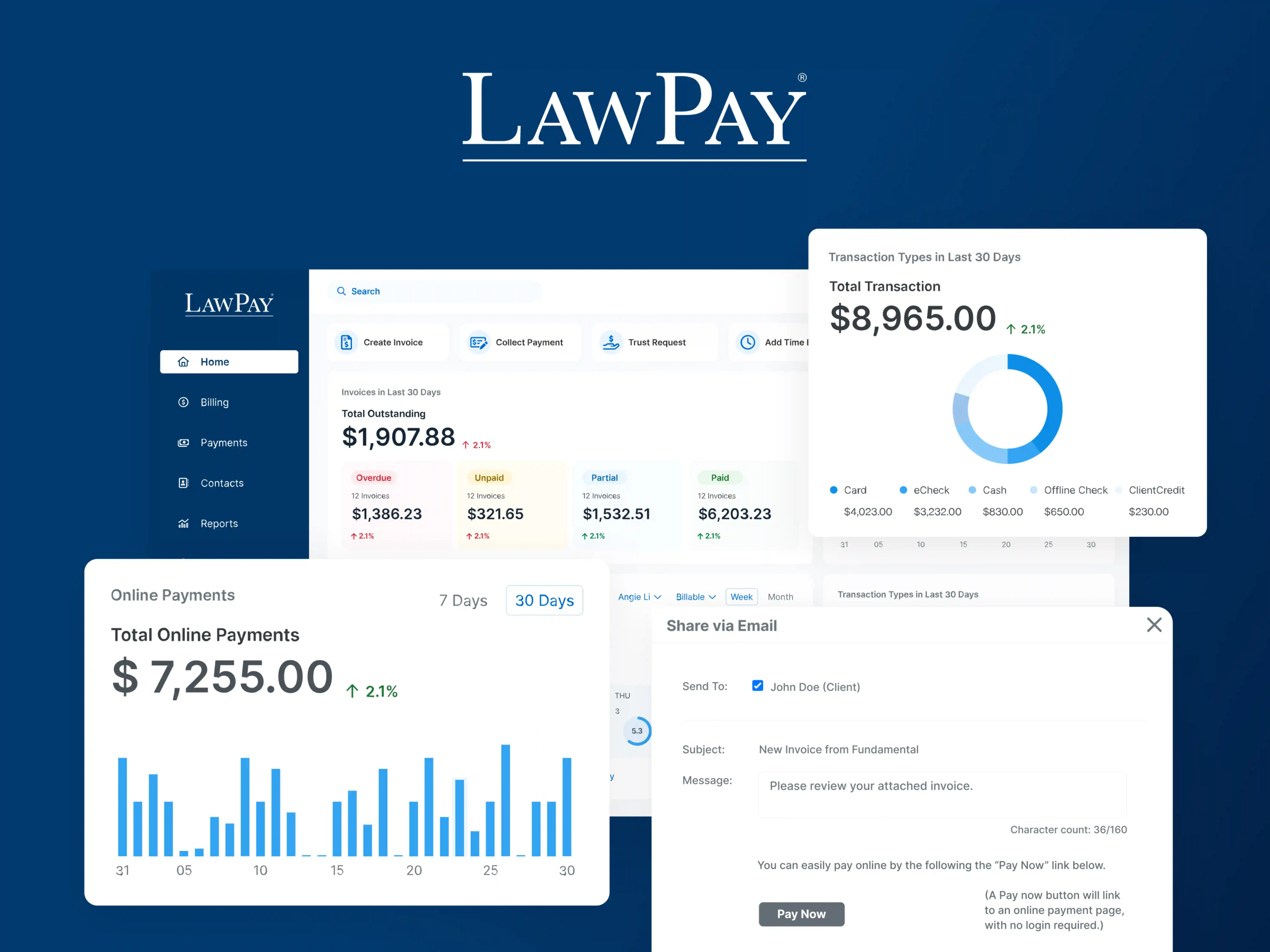Legal practice management software promises efficiency and improved customer service, but does it deliver?
Generally, legal practice management systems streamline operations for lawyers, though the level of efficiencies gained can vary. Make the most profitable software choice for your firm by understanding what legal practice management software is, what benefits it provides, and how to manage the decision-making process for a successful implementation.
What is Legal Practice Management Software?
These applications reduce the administrative burden of daily tasks with automation. In addition, they also centralize client and business information for easier reporting and firm management.
Key Features of Law Practice Management Software
The best legal software applications provide a robust set of features such as lead management, client file storage, calendaring, workflow automation, time tracking, billing, payments, and secure client communications. Let’s discuss why each of these features is important and what they can help your firm accomplish.
Lead Management
Lead management functionally allows for the tracking of prospects before they sign as clients. When prospects convert, their information automatically uploads into their secure case file online. This eliminates double data entry and allows for analysis of the client conversion process by case type.
Client File Storage
Secure, cloud-based file storage enables remote access, so you and your team can work from anywhere and at any time. Long-term, that translates to better, faster client service.
Cloud-based law firm management software should also have strong security protocols such as individual logins and user activity tracking. This ensures more oversight of document access vs. physical files in a cabinet.
Calendaring
A day in the life of a lawyer can involve intake meetings, client check-ins, court appointments, document deadlines, and so much more. A thoughtful calendaring system combines these in one interface with the ability to filter the view by client, appointment type, or staff member.
Workflow Automation
Workflow automation is a rule-based system that programs repeated tasks. An example of this would be using a status update in the lead management system to trigger the send of templated intake forms for an e-signature. You might also create default client calendars for specific legal issues that have repeatable cycles—meaning you’ll get an automated calendar reminder as they approach. Simply put, these automations do the work, so you don't have to.
Time Tracking and Billing
Time tracking and billing are a source of tedium for lawyers. Software that links case activities to time tracking adds efficiency by prompting lawyers to add time when actions are completed. As well, systems that link time records to invoice creation reduce manual data entry and produce more accurate bills.
Schedule a demo to see what LawPay can offer your firm.
Book Now
Payments
In today’s digital age, most clients expect to pay bills online via credit card or bank transfer. Implementing digital payments can be more complicated for lawyers, who must comply with state bar and IOLTA guidelines for handling funds.

A lawyer-specific payment management system should be compliant out of the box. Providing various online payment options will also improve customer service, expedite payments, and raise your collection rate. According to the LawPay and MyCase 2023 Benchmark Report: Getting Paid, firms collected 33% more with online payments vs. checks and cash.
Secure Client Communications
A complete client case file includes documents, notes, milestones, and a full record of conversations with clients. Full-featured case management software supports this by including a secure and integrated client communications portal, which allows clients to have a quick, secure way to communicate with you online. This helps you easily keep clients up to date on their cases and easily answer their questions without taking up too much time in your day.
Legal Practice Management Software Benefits
These features listed above empower law firms to deliver a better experience for their clients. Additionally, law practice management software features can lead to better staff collaboration, more work flexibility, increased client satisfaction, seamless integrations, and optimized payments and billing processes. Let’s dive into these benefits.
Better Staff Collaboration
Implementing a law practice management software should improve collaboration across your team. With all case matters in one centralized location, it's easy to share information and request feedback. It's also possible to monitor what each staff member is working on.
Some law firm management software apps allow you to assign projects or tasks to team members. As the task assigner, you would receive notifications when those tasks are completed or past due.
Many solutions also have chat or collaborative editing capabilities for communicating at each stage of a given project without exiting the application or sending an email.
More Work Flexibility
Law firm management software that includes secure document storage enables remote working meaning any team member with an internet connection and valid user permissions can access client files any time they need.
This level of work flexibility benefits clients by enabling faster answers and return calls. It also benefits staff members, who can make better use of their downtime in the car or waiting at the courthouse.
Increased Client Satisfaction
Perhaps the most important result of using a legal practice management system is increased client satisfaction. These applications streamline account management, which helps lawyers provide thoughtful representation and meet deadlines.
Clients realize efficiencies, too. They'll stay informed via notifications, status updates, and the client portal. They'll also benefit from convenient account management and payment options.
Seamless Integration
Ideally, a law firm practice management software will integrate with the software your firm is already using. This way, you can keep your favorite trusted solutions under the same umbrella as your practice management. You can manage cases, track expenses, generate leads, assemble documents, invoice clients, and more—all in one seamless tool.
Optimized Payments and Billing
Monitoring client financial activity is an essential part of every law practice. For this reason, the best legal practice management systems track and report on bills, timesheets, costs, and receivables. Ideally, you'd have a reporting dashboard that allows for easy data analysis.
Some systems also integrate with the industry's most trusted online payment solution, LawPay (MyCase’s sister company). LawPay provides secure payment portals, automated invoicing, and convenient payment and financing options. It’s also designed for IOLTA compliance and supports separated trust accounting.
More Time (for Doing What You're Meant to Do)
Using a law firm practice management software is guaranteed to save you time—your most precious resource.
A full-featured legal practice management system like MyCase is designed, from top to bottom, for productivity. MyCase enables legal professionals to save about three hours daily on average by streamlining and/or automating repetitive jobs. Client intake, document management, invoice creation, time and expense tracking, and calendaring no longer have to be tedious, time-consuming tasks.
You can also integrate MyCase with LawPay for added efficiencies. With compliant handling of client funds and convenient payment options, you'll spend less time on data entry and collections.
How to Choose the Right Legal Practice Management Software for Your Firm
The benefits you realize from implementing legal practice management software will vary based on the application you choose. Your ideal application is one that addresses your firm's pain points works well with applications you already use, is easy for your staff to adopt, and has ample security features.
1. Know Your Pain Points
Understanding your firm's least efficient tasks helps you select the best application for your needs. Sit down with your staff and talk through your current business processes and how they can be improved. Collaborate on a list of the firm's most pressing administrative needs so you know what features to prioritize when selecting a new application.
If you're struggling to track time and create detailed invoices, for example, your firm needs an application that integrates timekeeping and billing. Or, if creating error-free case documents is a challenge, you'd look for a system that supports reusable, templated documentation.
MyCase, for example, tackles both these challenges with ease. Our document-creation functionality is also combined with e-signature capabilities that make it quick and easy to gather legally binding signatures.
2. List Your Mission-Critical Applications
List all mission-critical software you're using today. Then, verify that any new case management application integrates with those programs.
For instance, if you're using QuickBooks, you need a legal practice management software that integrates with it. Without that, you'll waste valuable staff hours on duplicate data entry.
MyCase integrates with Gmail, Google Calendar, QuickBooks, Case Status, CourtDrive, and many more. And LawPay integrates easy online payments with MyCase and most other major practice management applications.
3. Ask Staff for Feedback
New software implementations fail when users cannot easily learn the interface. Invite your staff to participate in the software demo and encourage their feedback. The application launch will go smoother when everyone on your team supports the decision to move forward.
MyCase is designed to mirror the way you work. Sensible workflows and user-friendly interfaces allow for an easy launch. Customers are usually up and running in two days, which is the fastest implementation time in the industry.
4. Review Security Features
Your clients trust that the firm will protect their sensitive information. This can be done through encryption of stored files and communication, user authentication, activity logs that are regularly reviewed, and automatic backups.
MyCase uses bank-grade encryption for transmitted data, plus a stronger 256-bit AES encryption on stored information. Activity logs and personal logins also provide insight into who's accessing which files. Nightly backups safeguard your case files and confidential information in case any data corruption does occur.
Final Notes
Case management software apps create efficiencies by integrating front- and back-office operations with your legal practice. Over time, those efficiencies translate to happier clients and staff and better legal representation.
Schedule a demo to see what LawPay can offer your firm.
Book Now
For best results, choose reputable, lawyer-specific applications that address your firm's most time-consuming processes and integrate with the solutions you already use. LawPay and MyCase are trusted, best-in-class choices for online payments and case management. Plus, both have top-rated customer service and support for easy implementation.
To see these applications in action, sign up for a free MyCase trial or schedule a LawPay demo for easy payment integration with your case management solution.
About the author

Catherine BrockContent Writer
Catherine Brock is a Content Writer for leading legal software companies, including MyCase, Docketwise, CPACharge, CASEpeer, and LawPay—the #1 legal payment processor. She covers emerging legal technology, financial wellness for law firms, the latest industry trends, and more.
